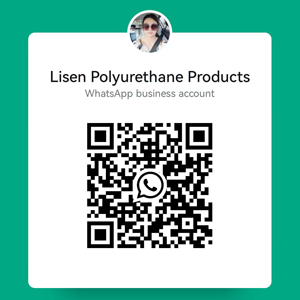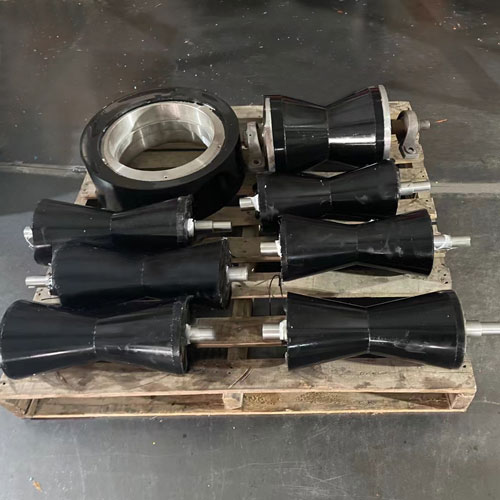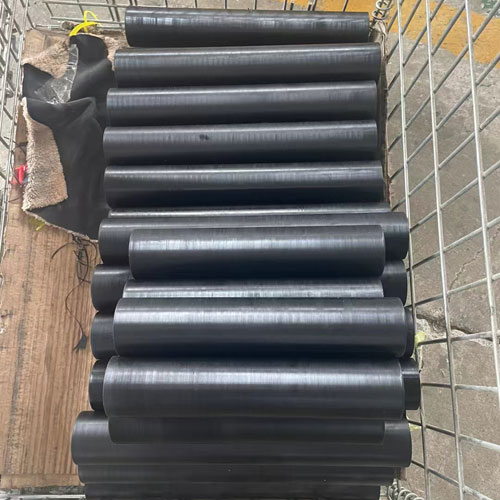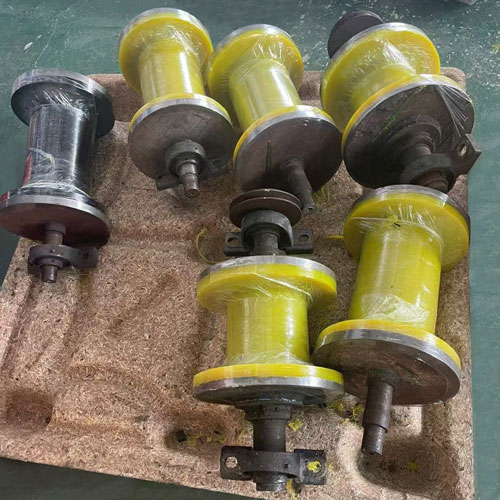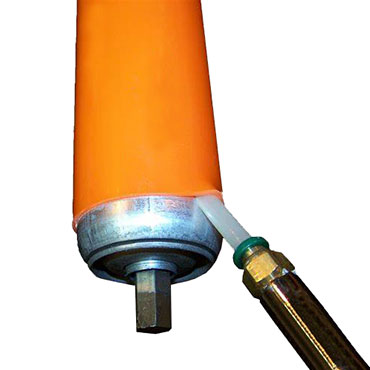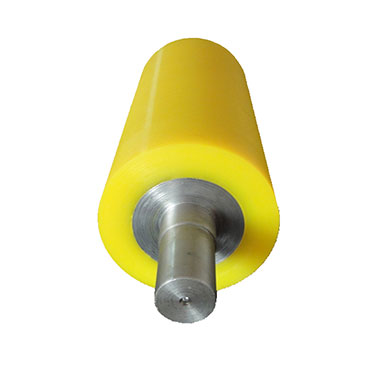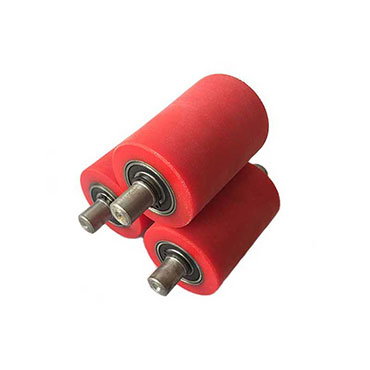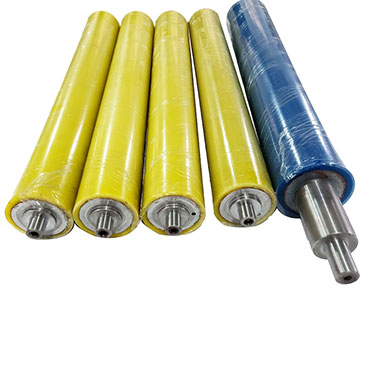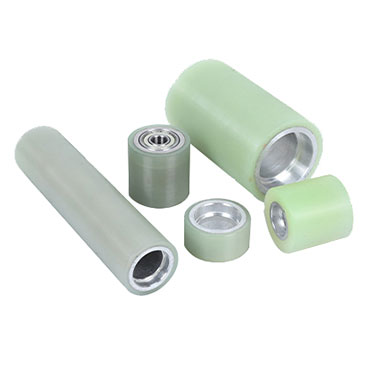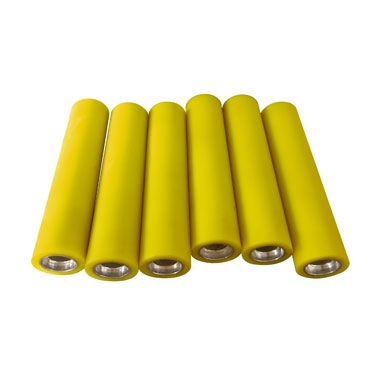
Polyurethane Pipe Rollers
Polyurethane pipe roller is a cylindrical component made of polyurethane material, mainly used for conveying and processing pipelines. They are usually composed of a metal roller core and an outer layer of polyurethane. Our polyurethane pipeline rollers can withstand the constant friction and abrasion that occurs when pipes are being moved or conveyed over them. They can maintain their shape and performance over a long period, reducing the need for frequent replacements.
Custom Cast Urethane Pipeline Roller Solution
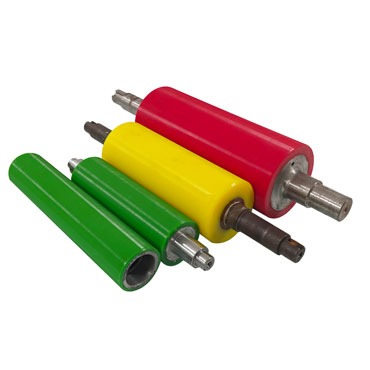
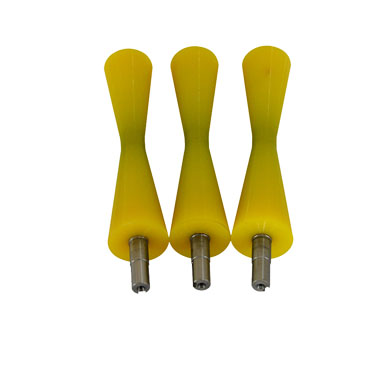
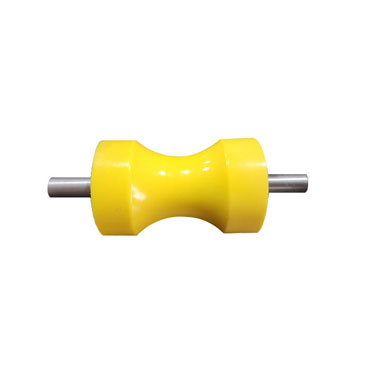
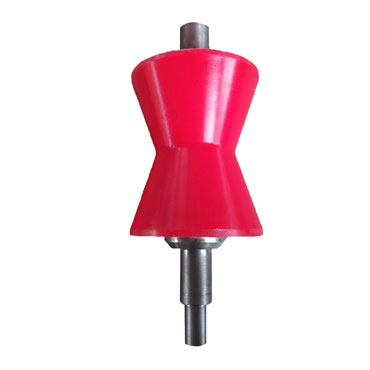
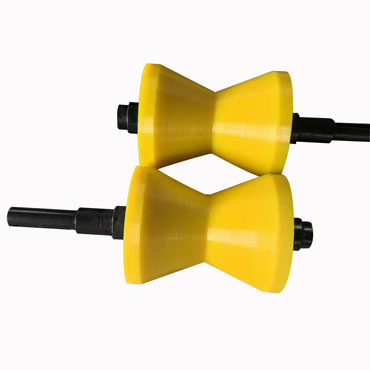

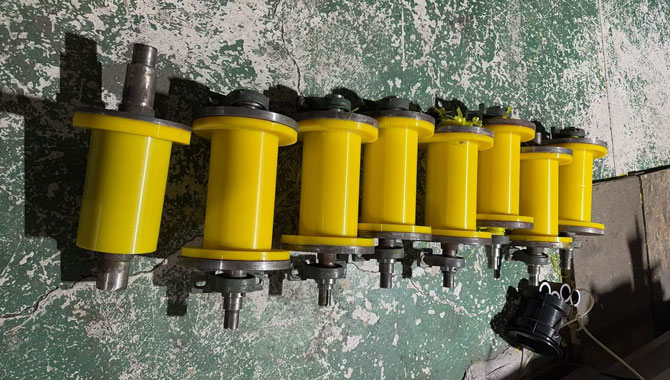
Polyurethane Pipe Rollers Application
- 1. Industrial Pipeline Systems: In industrial settings such as oil refineries, chemical plants, and power stations, polyurethane pipe rollers are used to support and move large - diameter pipes. They help in the efficient installation and maintenance of pipelines, ensuring that the pipes can be transported and positioned accurately.
- 2. Construction Sites: On construction sites, these rollers are used to move pipes during the installation of plumbing, drainage, and other piping systems. Their ability to handle different pipe sizes and materials makes them versatile tools for construction workers.
- 3. Manufacturing Processes: In manufacturing plants that produce pipes or use pipes in their production processes, polyurethane pipe rollers are used in conveyor systems to move the pipes between different production stages. This helps to streamline the manufacturing process and improve productivity.
Properties of Polyurethane Pipe Rollers
- High Wear Resistance
- Good Elasticity
- Chemical Resistance
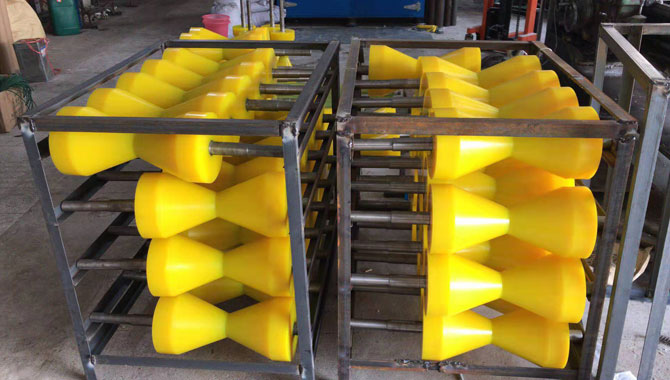
Custom Polyurethane Pipe Rollers
- Product Specifications
- Gallery
Polyurethane pipe rollers can vary depending on their intended use and design. Here are some common aspects of their specifications.
Dimensions of Polyurethane pipe rollers
1). Diameter: This can range from a few centimeters to several meters, depending on the size of the pipes they are intended to support. For small - scale applications in workshops or home plumbing, the diameter might be 5 - 10 cm. In industrial settings, where large - diameter pipes are involved, the roller diameter could be 50 cm or more.
2). Length: The length of the roller is designed to match the width of the pipes or the support requirements. It can be as short as 10 cm for narrow pipes and up to several meters for extremely wide or long pipes.
3). Axle Size: The size of the axle hole in the roller is crucial as it determines the compatibility with the support structure. The diameter of the axle hole can range from a few millimeters for small - scale applications to several centimeters for heavy - duty industrial use.
Material Properties
1). Polyurethane Hardness: Expressed on the Shore hardness scale (e.g., Shore A or Shore D). For general - purpose pipe rollers, a Shore A hardness in the range of 60 - 90 is common. Softer rollers (lower Shore A values) are more flexible and better for absorbing vibrations, while harder rollers (higher Shore A or Shore D values) are more suitable for heavy - load applications where high wear resistance is required.
2).Tensile Strength: This indicates the maximum amount of stress the polyurethane can withstand before breaking. High - quality polyurethane pipe rollers typically have a tensile strength of 10 - 30 MPa (megapascals), depending on the specific formulation of the polyurethane.
3).Elongation at Break: It measures the percentage of elongation the polyurethane can undergo before it breaks. A good range for polyurethane used in pipe rollers is 300 - 600%, which ensures the material has enough flexibility to adapt to the movement of the pipes without cracking.
Load - Bearing Capacity
1). Static Load Capacity: This is the maximum weight the roller can support when the pipe is stationary. It can range from a few kilograms for small, lightweight rollers used in domestic applications to several tons for heavy - duty industrial rollers. For example, a small - scale roller might have a static load capacity of 5 - 20 kg, while an industrial roller could support 5 - 10 tons or more.
2). Dynamic Load Capacity: When the pipes are in motion, the roller needs to withstand additional forces. The dynamic load capacity is typically lower than the static load capacity but is still an important specification. It is designed to ensure the roller can function properly during the continuous movement of the pipes.
Surface Finish
1). Smoothness: The surface of the polyurethane pipe roller can be smooth to reduce friction with the pipes. A smooth surface finish also helps prevent scratches on the pipes. The surface roughness can be specified in terms of Ra (arithmetical mean deviation of the assessed profile), with values typically in the range of 0.1 - 1 µm for high - quality smooth - surface rollers.
2). Grooved or Textured Surfaces: In some cases, the roller surface may be grooved or textured. For example, a U - grooved surface can provide better grip for the pipes, preventing them from slipping. The depth and width of the grooves are specified according to the requirements of the application.
Temperature Resistance
Operating Temperature Range: Polyurethane pipe rollers can be designed to operate within a certain temperature range. The typical operating temperature range is from - 20°C to 80°C. However, special formulations can extend this range. For example, some high - performance rollers can operate at temperatures as low as - 40°C or as high as 120°C for short periods.
Chemical Resistance
Resistance to Specific Chemicals: The rollers can be formulated to resist different chemicals. They are often tested for resistance to common substances such as water, oils, acids, and alkalis. The level of resistance is typically indicated as excellent, good, fair, or poor, depending on the extent of degradation or change in properties when exposed to the chemicals.
Polyether polyols PTMG series prepolymer
| Model | D2135 | D2142 | D3160 |
| NCO content / % | 35±0.1 | 4.2±0.2 | 6.2±0.2 |
| State of matter At 20℃ | White waxy solid | White waxy solid | White waxy solid |
| MOCA 100g prepolymer dosage /g | 10 | 12.1 | 18 |
| Viscosity(85℃)/ mpa * s | 1200 | 750 | 480 |
| Mixing Temperature /℃(prepolymer/MOCA) | 85/120 | 85/120 | 80/120 |
| Gel time /min | 11 | 10 | 6 |
| Post vulcanization time (100℃)/h | 10 | 10 | 10 |
| Hardness ( shore A) | 85±2 | 90±1 | 95A±1 (49D±2) |
| 100% constant tensile stress /MPa | 5.4 | 7.5 | 12.8 |
| 300% constant tensile stress /MPa | 9.6 | 14.1 | 36.3 |
| Tensile strength /MPa | 27 | 33 | 48 |
| Elongation at break / % | 550 | 500 | 350 |
| Tear strength (right angle) /(KN/m) | 65 | 78 | 95 |
| Tear strength (pants type) /(KN/m) | 21 | 28 | 33 |
| Rebound /% | 61 | 54 | 47 |
| Density (25℃)/(g/cm) | 1.07 | 1.09 | 1.13 |
Polyester polyol/TDI series prepolymer
| Model | D3136 | D3145 | D3160 |
| NCO content / % | 3.6±0.1 | 4.5±0.2 | 6.0±0.2 |
| State of matter At 20℃ | White waxy solid | White waxy solid | White waxy solid |
| MOCA 100g prepolymer dosage /g | 10.5 | 13.2 | 17.2 |
| Viscosity(85℃)/ mpa * s | 1800 | 1200 | 900 |
| Mixing Temperature /℃(prepolymer/MOCA) | 85/120 | 80/120 | 75/120 |
| Gel time /min | 9 | 7.5 | 5 |
| Post vulcanization time (100℃)/h | 10 | 10 | 10 |
| Hardness ( shore A) | 85±1 | 91±1 | 96A±1 (54D) |
| 100% constant tensile stress /MPa | 4.2 | 6.7 | 11.5 |
| 300% constant tensile stress /MPa | 8.3 | 12.5 | 21.3 |
| Tensile strength /MPa | 48 | 52 | 55 |
| Elongation at break / % | 670 | 610 | 530 |
| Tear strength (right angle) /(KN/m) | 75 | 95 | 124 |
| Tear strength (pants type) /(KN/m) | 34 | 42 | 49 |
| Rebound /% | 39 | 32 | 33 |
| Density (25℃)/(g/cm) | 1.26 | 1.27 | 1.29 |
| wearing out by friction mm³ | 40 | 48 | 57 |
MDI series prepolymer
| Model | D3560M |
| NCO content / % | 6.0 |
| Viscosity(80℃)/ mpa * s | 1780 |
| D3560M : D3575-C | 100:6.1 |
| Gel time /min | 8-11 |
| Post vulcanization time (100℃)/h | 48 |
| Hardness ( shore A) | 83±3 |
| Tensile strength /MPa | 46 |
| Elongation at break / % | 580 |
| Tear strength (right angle) /(KN/m) | 82 |
| Rebound /% | 38 |
| Density (25℃)/(g/cm) | 1.2 |
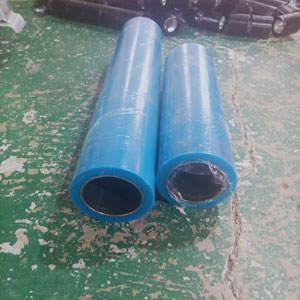
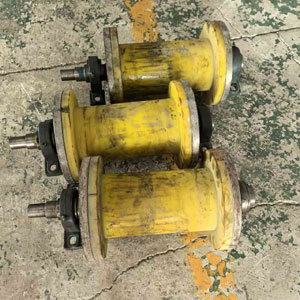
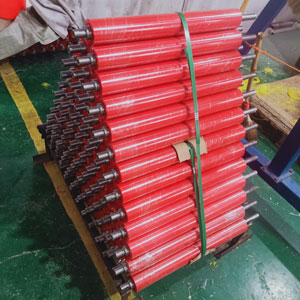
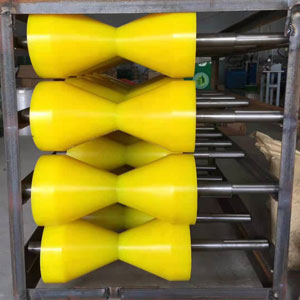
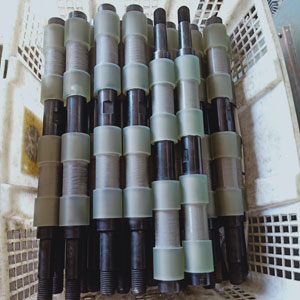
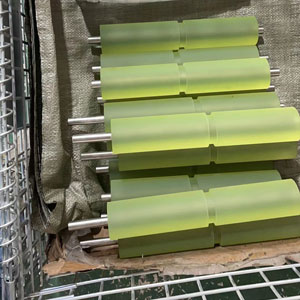
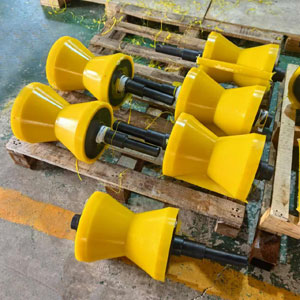
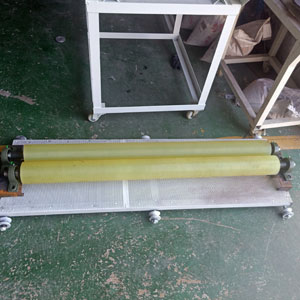
Related Products
Custom Cast Polyurethane Roller Manufacturers
Lisen provides custom cast urethane rollers solutions, fabricates steel cores, processes urethane, and we also provide roller recycling services for used and existing rolls. Our custom polyurethane rollers can be reduce noise and extend your component life, to saving our customers time and money. We can customize polyurethane rollers in various sizes, hardness, and shapes to suit your application or design drawings.
Yes, we can. We specialize in custom polyurethane products and can produce polyurethane tube rolls to meet your specific requirements for size, hardness, and load capacity.
The service life of polyurethane rolls is affected by many factors, such as the operating environment, load frequency, and the material to be conveyed. Under normal working conditions, our polyurethane rolls can be used for a long time. We will provide reasonable suggestions to prolong its service life.
Absolutely. Our products are chemically resistant and can withstand all types of corrosive substances used in chemical piping to ensure long term stable operation.
This depends on the complexity of the order and production scheduling. Generally speaking, the lead time is shorter for simple customized products, while complex customized projects may take more time. We will give you an accurate lead time estimate when you place your order.
Polyurethane rollers have excellent abrasion and fatigue resistance, low coefficient of friction, reduced energy consumption, improved conveying efficiency, and excellent vibration and noise damping.

